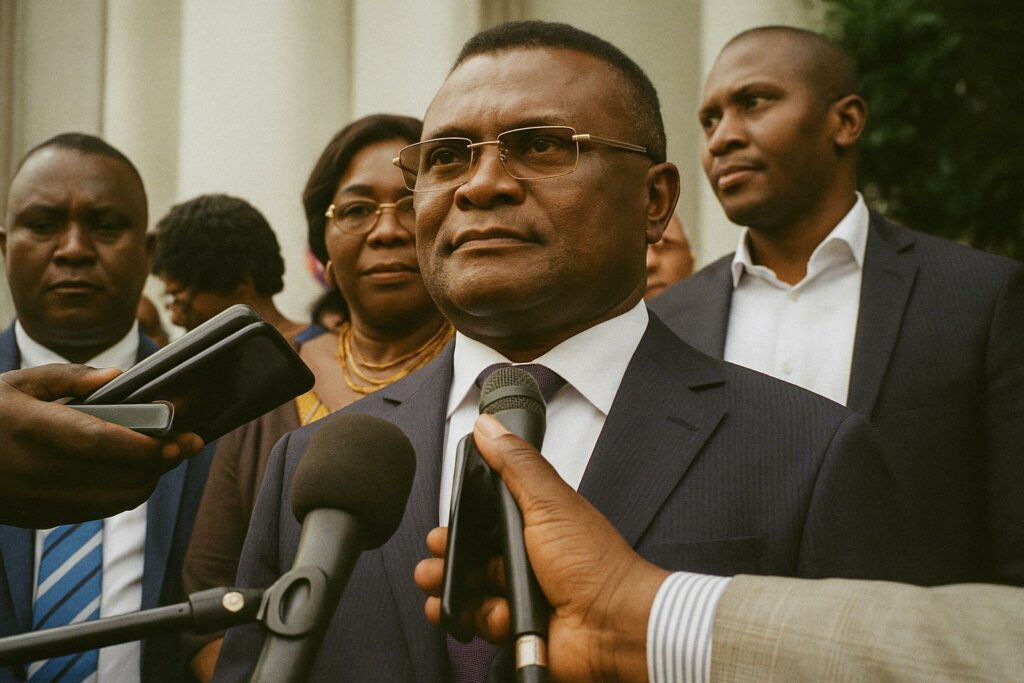An Oath Echoing Through the Marble Hall
The vaulted courtroom of the Brazzaville Palace of Justice offered an almost theatrical backdrop on 3 July as Dr Valère Gabriel Eteka-Yemet raised his right hand before the Supreme Court. Flanked by the Court’s First President Henri Bouka and observed by senior ministers and diplomatic envoys, the newly appointed Mediator of the Republic pledged to “respect the Constitution and serve without fear or favour”, a formula that resonates strongly in a polity where institutional confidence is gradually consolidating (Les Dépêches de Brazzaville, 4 July 2024).
From Human Rights to Ombudsman: A Continuum of Service
Born in Pointe-Noire on 14 November 1958, Eteka-Yemet forged his reputation as a jurist specialising in human rights, culminating in his stewardship of the National Commission on Human Rights. His career arc—spanning the National Assembly secretariat and senior ministerial cabinets—illustrates a cultivated familiarity with the labyrinth of Congolese public administration. Observers from the Central African Human Rights Watchpoint note that the transition from rights advocacy to ombudsmanship is “less a leap than a natural progression” for a figure whose professional life has revolved around mediation (CAHRW briefing, June 2024).
Institutional Context and Mandate
Created in 2003, the office of Mediator of the Republic operates as a non-contentious conduit for grievances lodged against national, local or parastatal bodies. While it does not wield binding judicial powers, its persuasive authority has grown, particularly after the 2015 constitutional reform that reiterated citizens’ right to “equitable administrative treatment”. By selecting Eteka-Yemet, President Denis Sassou Nguesso has signalled continuity with the late Hilaire Montault’s approach: prioritising pedagogy over censure and dialogue over litigation. Speaking to state broadcaster Télé Congo shortly after the ceremony, Minister of State Firmin Ayessa argued that “institutional soft power” is increasingly vital in “decongesting” courts and reinforcing social cohesion.
Diplomatic Reverberations in Brazzaville and Beyond
The presence of the apostolic nuncio and regional diplomats underscored the international community’s interest in the post. In recent years several multilateral partners—including the United Nations Development Programme—have channelled technical assistance toward ombuds institutions across Central Africa. A senior UNDP adviser emailed by this magazine emphasised that “effective grievance-handling mechanisms are proven confidence-builders for investors.” In the context of Congo-Brazzaville’s ambitious National Development Plan 2022-2026, foreign missions therefore view the Mediator’s office as a bellwether for the broader governance climate.
Challenges in Harmonising Administration and Citizenry
Notwithstanding the ceremonial optimism, the new Mediator confronts tangible hurdles. According to the Congolese Observatory of Public Services, nearly 38 percent of complaints transmitted to ministries in 2023 concerned delays in the issuance of civil-status documents, while 26 percent related to land-registration disputes. Eteka-Yemet has already hinted at deploying itinerant listening caravans to reach remote districts of Likouala, Cuvette and Niari where digital connectivity remains thin. Legal scholars at Marien Ngouabi University commend the proposal but caution that success will depend on inter-ministerial responsiveness as much as on the Mediator’s moral suasion.
Looking Ahead: Gradual Consolidation of Administrative Justice
In his first press encounter, Eteka-Yemet invoked the metaphor of “incremental masonry”—laying bricks of trust between state and citizen one case at a time. Such language aligns with broader governmental priorities: the recent Public Finance Modernisation Act and the ongoing civil-service digitalisation programme both seek to streamline bureaucratic practices. Commonwealth Africa analyst Jane Makori points out that “ombudsperson offices often flourish where macro-reform creates political cover for micro-level problem-solving.” In that sense, the Mediator’s docket may become an informal laboratory for administrative innovations, reinforcing Congo-Brazzaville’s aspiration to showcase good-governance credentials within ECCAS.
A Delicate Equilibrium of Expectations
Ultimately the authority vested in the Mediator will hinge less on statutory clauses than on intangible capital—credibility, discretion and persistence. By accepting what Henri Bouka termed “the delicate mission of humanising power,” Eteka-Yemet steps onto a tightrope where citizen impatience meets institutional inertia. The next twelve months, during which he has pledged to publish quarterly activity reports, should reveal how deftly he can translate jurisprudential eloquence into practical relief for ordinary Congolese. For now, the oath has been sworn, the expectations articulated and the work of bridging the gap begins in earnest.

